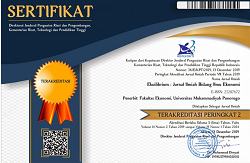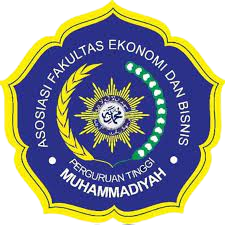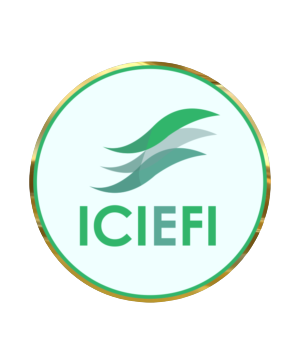EFFECT OF CORPORATE SOCIAL RESPONSIBILITY (CSR), PROFITABILITY, AND PROFIT MANAGEMENT ON TAX EVASION
DOI:
https://doi.org/10.24269/ekuilibrium.v14i1.2019.pp56-67Abstract
This study examines the effect of Corporate Social Responsibility (CSR), profitability, and profit management on tax evasion. We use manufacture company’s subsector food and beverage listed on the Indonesia Stock Exchange (BEI) during 2012-2016, based on purposive sampling method was obtained 8 companies. The indicators disclosure of CSR is using Global Reporting Initiative (GRI) guideline. Variable profitability is measured by a ratio of ROA, and profit management is measured by discretionary accrual. The dependent variable is proxy by CETR. We use multiple linear regression method. The result shows that the CSR and profitability have asignificant influenceon tax evasion. profit management does not have a significant influence on tax evasion.Â
References
Deny, S. (2017). Industri Manufaktur Bisa Jadi Andalan Tingkatkan Penerimaan Pajak†Ertikel Bisnis dan Ekonomi. Retrieved October 31, 2017, from https://m.liputan6.com/amp/3145304/industri-manufaktur-bisa-jadi-andalan-tingkatkan-penerimaan-pajak.
Dewinta, I. A. R., & Setiawan, P. E. (2016). Pengaruh Ukuran Perusahaan, Umur Perusahaan, Profitabilitas, Leverage, dan PertumbuhanPenjualan Terhadap Tax Avoidance. E-Jurnal Akuntansi Universitas Udayana, 14(3).
Dwilopa, D. E. (2016). Pengaruh Corporate Social Responsibility, Capital Intensity, Dan Perencanaan Pajak Terhadap Penghindaran Pajak. Jurnal Universitas Muhammadiyah Yogyakarta, 1–15.
Femitasari, L. (2014). Pengaruh Proporsi Dewan Komisaris Independen, Kepemilikan Institusional Dan Corporate Social Responsibility Terhadap Agresivitas Pajak. Skripsi Universitas Katolik Widya Mandala Surabaya, 1–17.
Ghozali, I. (2011). Aplikasi Analisis Multivariate dengan Program IBM SPSS 19. Semarang: Badan Penerbit Universitas Diponegoro.
Heryuliani, N. (2015). Pengaruh Karakteristik Perusahaan dan Kepemilikan Keluarga terhadap Penghindaran Pajak. Universitas Islam Negeri Syarif Hidayatullah Jakarta.
Hidayati, N. (2017). Pengaruh Corporate Social ResponsibilityDan GoodCorporate GovernanceTerhadap Penghindaran Pajak. Jurnal Ilmu Dan Riset Akuntansi, 6(3), 1–19.
Ifanda, B. A. (2016). Analisis Pengaruh Profitabilitas, Leverage, DanKompensasi Rugi Fiskal Terhadap Tax Avoidance. Universitas Lampung.
Maharani, I. G. A. C. (2014). Pengaruh Corporate Governance,Profitabilitas Dan Karakteristik Eksekutif Pada Tax Avoidance Perusahaan Manufaktur. E-Jurnal Akuntansi, Universitas Udayana, 9(2), 525–539.
Mardiasmo. (2011). PerpajakanEdisi Revisi 2011. Yogyakarta: Andi.
Ngadiman, & Puspitasari, C. (2014). Pengaruh Leverage, Kepemilikan Institusional, dan Ukuran Perusahaan terhadap Penghindaran Pajak (Tax Avoidance) pada Perusahaan Sektor Manufaktur yang Terdaftar di Bursa Efek Indonesia 2010-2012. Jurnal Akuntansi, 8(3), 408–421.
Pradipta, D. H. (2015). Pengaruh Corporate Social Responsibility (CSR), Profitabilitas, Leverage, Dan Komisaris Independen Terhadap Praktik Penghindaran Pajak. Universitas Gadjah Mada.
Putri, L. T. Y. (2014). Pengaruh Likuiditas, Manajemen Laba Dan Corporate GovernanceTerhadap Agresivitas Pajak Perusahaan. Jurnal Akuntansi Universitas Negeri Padang, 2(1).
Rinaldi., dan C. C. (2015). Pengaruh Profitabilitas, Ukuran Perusahaan dan Kompensasi Rugi Fiskal Terhadap Tax Avoidance. Snema Fakultas Ekonomi Universitas Negeri Padang.
Santoso, I., & Rahayu, N. (2013). Corporate Tax Management. Jakarta: Observation & Research of Taxation (Ortax).
Scott, W. R. (2009). Financial Accounting Theory (5th ed.). Prentice Hall, Inc.
Sufiyanti, F., & Wardani, D. K. (2016). Analisis Pengaruh Rasio Keuangan Terhadap Peringkat Obligasi pada Perusahaan yang Terdaftar di Bursa Efek Indonesia (BEI). Prosiding Seminar Nasional Dan The 3rd Call for Syariah Paper.
Sugiyono. (2010). Metode Penelitian Bisnis. Bandung: CV Alfabeta.
Suyanto, K. D. (2012). Likuiditas, Leverage, Komisaris Independen, Dan Manajemen Laba Terhadap Agresivitas Pajak Perusahaan. Jurnal Keuangan Dan Perbankan, 16(2), 167–177.
Tarigan, H. R. M. (2016). Pengaruh Corporate Social Responsibility dan Profitabilitas Terhadap Agresivitas Pajak (Studi Empiris Pada Perusahaan Manufaktur yang Terdaftar di BEI Periode 2012 -2014).
Wardani, D. K. (2013). Manajemen Pajak Dipandang dari Sisi Fiskus. Jurnal Akuntansi Fakultas Ekonomi Universitas Sarjanawiyata Tamansiswa, 1(1).
Wardani, D. K., & Kusuma, I. W. (2012). Is Earnings Management Informational or Opportunistic? Evidence from ASEAN Countries. Gadjah Mada International Journal of Business, 14(1), 61–75.
Watson, L. (2014). Corporate Social Responsibility, Tax Avoidance, and Earnings Performance. Journal of the American Taxation Association, 37(2), 1–34.
Yunistiyani, V., & Tahar, A. (2017). Analisis Hubungan Corporate Social ResponsibilityDan Agresivitas Pelaporan Keuangan Terhadap Agresivitas Pajak Dengan Good Corporate GovernanceSebagai Variabel Pemoderasi. Jurnal Ilmiah Akuntansi, 2(1).
Yuwono, A. (2016). Pengaruh Manajemen Laba Terhadap Penghindaran Pajak. Widya Mandala Catholic University Surabaya.
Downloads
Additional Files
Published
How to Cite
Issue
Section
License
Retained Rights/Terms and Conditions of Publication
1. As an author you (or your employer or institution) may do the following:
- make copies (print or electronic) of the article for your own personal use, including for your own classroom teaching use;
- make copies and distribute such copies (including through e-mail) of the article to research colleagues, for the personal use by such colleagues (but not commercially or systematically, e.g. via an e-mail list or list server);
- present the article at a meeting or conference and to distribute copies of the article to the delegates attending such meeting;
- for your employer, if the article is a ‘work for hire’, made within the scope of your employment, your employer may use all or part of the information in the article for other intra-company use (e.g. training);
- retain patent and trademark rights and rights to any process, procedure, or article of manufacture described in the article;
- include the article in full or in part in a thesis or dissertation (provided that this is not to be published commercially);
- use the article or any part thereof in a printed compilation of your works, such as collected writings or lecture notes (subsequent to publication of the article in the journal); and prepare other derivative works, to extend the article into book-length form, or to otherwise re-use portions or excerpts in other works, with full acknowledgement of its original publication in the journal;
- may reproduce or authorize others to reproduce the article, material extracted from the article, or derivative works for the author's personal use or for company use, provided that the source and the copyright notice are indicated, the copies are not used in any way that implies RCEPM-LIPI endorsement of a product or service of any employer, and the copies themselves are not offered for sale.
All copies, print or electronic, or other use of the paper or article must include the appropriate bibliographic citation for the article's publication in the journal.
2. Requests from third parties
Although authors are permitted to re-use all or portions of the article in other works, this does not include granting third-party requests for reprinting, republishing, or other types of re-use. Requests for all uses not included above, including the authorization of third parties to reproduce or otherwise use all or part of the article.
3. Author Online Use
- Personal Servers. Authors and/or their employers shall have the right to post the accepted version of articles pre-print version of the article, or revised personal version of the final text of the article (to reflect changes made in the peer review and editing process) on their own personal servers or the servers of their institutions or employers without permission from Universitas Muhamamdiyah Ponorogo, provided that the posted version includes a prominently displayed Universitas Muhamamdiyah Ponorogo copyright notice and, when published, a full citation to the original publication, including a link to the article abstract in the journal homepage. Authors shall not post the final, published versions of their papers;
- Classroom or Internal Training Use. An author is expressly permitted to post any portion of the accepted version of his/her own articles on the author's personal web site or the servers of the author's institution or company in connection with the author's teaching, training, or work responsibilities, provided that the appropriate copyright, credit, and reuse notices appear prominently with the posted material. Examples of permitted uses are lecture materials, course packs, e-reserves, conference presentations, or in-house training courses;
- Electronic Preprints. Before submitting an article to an Ekuilibrium: Jurnal Ilmiah Bidang Ilmu Ekonomi, authors frequently post their manuscripts to their own web site, their employer's site, or to another server that invites constructive comment from colleagues. Upon submission of an article to Ekuilibrium: Jurnal Ilmiah Bidang Ilmu Ekonomi, an author is required to transfer copyright in the article to Economy Faculty Universitas Muhammadiyah Ponorogo, and the author must update any previously posted version of the article with a prominently displayed Economy Faculty Universitas Muhammadiyah Ponorogo copyright notice. Upon publication of an article by the Universitas Muhammadiyah Ponorogo, the author must replace any previously posted electronic versions of the article with either (1) the full citation to the work with a Digital Object Identifier (DOI) or link to the article abstract in Ekuilibrium: Jurnal Ilmiah Bidang Ilmu Ekonomi journal homepage, or (2) the accepted version only (not the final, published version), including the Economy Faculty Universitas Muhammadiyah Ponorogo copyright notice and full citation, with a link to the final, published article in journal homepage.
4. Articles in Press (AiP) service
Economy Faculty Universitas Muhammadiyah Ponorogo may choose to publish an abstract or portions of the paper before we publish it in the journal. Please contact our Production department immediately if you do not want us to make any such prior publication for any reason, including disclosure of a patentable invention.
5. Author/Employer Rights
If you are employed and prepared the article on a subject within the scope of your employment, the copyright in the article belongs to your employer as a work-for-hire. In that case, Economy Faculty Universitas Muhammadiyah Ponorogo assumes that when you sign this Form, you are authorized to do so by your employer and that your employer has consented to the transfer of copyright, to the representation and warranty of publication rights, and to all other terms and conditions of this Form. If such authorization and consent has not been given to you, an authorized representative of your employer should sign this Form as the Author.
6. RCEPM-LIPI Copyright Ownership
It is the formal policy of Economy Faculty Universitas Muhammadiyah Ponorogo to own the copyrights to all copyrightable material in its technical publications and to the individual contributions contained therein, in order to protect the interests of the Economy Faculty Universitas Muhammadiyah Ponorogo, its authors and their employers, and, at the same time, to facilitate the appropriate re-use of this material by others. Economy Faculty Universitas Muhammadiyah Ponorogo distributes its technical publications throughout the world and does so by various means such as hard copy, microfiche, microfilm, and electronic media. It also abstracts and may translate its publications, and articles contained therein, for inclusion in various compendiums, collective works, databases and similar publication.
7. Licensing Terms
Ekuilibrium is licensed under a Creative Commons Attribution-ShareAlike 4.0 International License.
Permissions beyond the scope of this license may be available at https://journal.umpo.ac.id/














